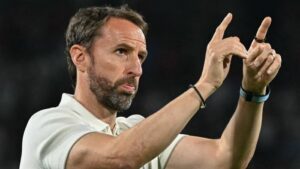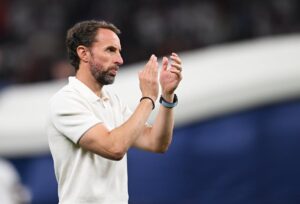
RevSportz Comment
By the time Gareth Southgate took charge of the England men’s national football team, the half-decade of underachievement under Sven-Goran Eriksson were starting to look like glory years. Eriksson had taken England to successive World Cup quarterfinals in 2002 and 2006, with a last-eight appearance at Euro 2004 sandwiched in between. He had enjoyed no luck either, losing two of those matches on penalty kicks to Portugal and the other to a freak goal from Ronaldinho.
The decline thereafter was precipitous. England didn’t qualify for Euro 2008 – prompting the ‘Wally with a brolly’ headlines about Steve McLaren, then manager – and there was a round-of-16 exit to Germany under Fabio Capello in South Africa in 2010. When Capello then resigned in a fit of pique months before Euro 2012, after the Football Association (FA) had removed John Terry from the captaincy, they turned to Roy Hodgson, who had a wealth of managerial experience across Europe.
Hodgson perhaps exceeded expectations by taking England to the quarters at Euro 2012, losing to Italy on penalties, but though his teams steamrolled their way through qualification, the rest of his tenure was a sorry tale when it came to the big tournaments. In Brazil in 2014, England limped home with just a point against Costa Rica, having lost to both Italy and Uruguay, and the nadir was reached at Euro 2016, with a second-round exit against mighty…Iceland, whose population of 330,000 was less than most London boroughs.
“Iceland is going to play France on Sunday,” yelled Gudmundur Benediktsson, the Icelandic commentator who went on to gain a cult following. “France, Iceland! You [England] can go home. You can go out of Europe. You can go wherever the hell you want. … England 1, Iceland 2 is the closing score here in Nice. And the fairy tale continues.”
The juxtaposition of Brexit – England had just voted to leave the European Union – with the awful football result rubbed salt into the wounds, and English football’s stock was lower than it had been for decades when the FA turned to Southgate, whose work with the youth team set-up had begun to catch the eye.
For the Latest Sports News: Click Here

Southgate had been a solid defender in his prime, enjoying his best years with Aston Villa, and playing for England managers like Terry Venables and Glenn Hoddle, both of whom had placed the emphasis on front-foot football. When Southgate made best use of a favourable draw to take England to the last four of the World Cup in 2018 – only the third time they had gone that far – he could scarcely do any wrong.
But the fault lines that would become yawning cracks years later were already beginning to show. Against the better sides, England lacked the self-belief and nous to kill off games. Croatia wrested back the initiative in the semi-final, while Belgium were too strong in the third-place play-off. Four years later, in Qatar, England went out in the last eight against France, the first formidable side they had played. While the French stars strutted around the pitch, England’s leading lights seemed to shrink under the glare.
By then, Southgate had already lost his first Euro final, with Italy fighting back from conceding a very early goal to Luke Shaw at Wembley. This was not the Italy of Paolo Maldini, Andrea Pirlo, Alessandro del Piero and Francesco Totti, but Roberto Mancini’s team were allowed to control the game for vast stretches as England once again lost their nerve. There was an inevitability to the penalty shootout loss.
On paper, two Euro finals and a World Cup semi-final, two of those tournaments played away from home, places Southgate in the highest echelon of England managers, perhaps behind only Sir Alf Ramsey. But with the squad he had – at Euro 2024, he had La Liga’s Player of the Season, a forward who had shattered Bundesliga scoring record and a wide player who was the best in the English Premier League (EPL) last season – the style of play should have been far more expansive and dominant.
Instead, England went through the tournament with the handbrake off, nudged past one quality team, the Netherlands, with a massive stroke of luck, and then came a cropper against the best side in the competition. If you’d said before the competition that Lamine Yamal and Nico Williams would be streets better than Bukayo Saka and Phil Foden, and that Dani Olmo would outshine Jude Bellingham, you’d have been mocked. But while Spain were a team in the truest sense, England played most matches without any coherent plan and with key players well off their best.
Southgate restored pride in the Three Lions shirt, but he couldn’t take the final step. It remains to be seen if his successor, whether that’s Eddie Howe, Graham Potter or Mauricio Pochettino, can get a hugely talented bunch to play together, and on the front foot. Southgate, despite being part of the Venables team that so memorably thumped the Netherlands 4-1, never could.




